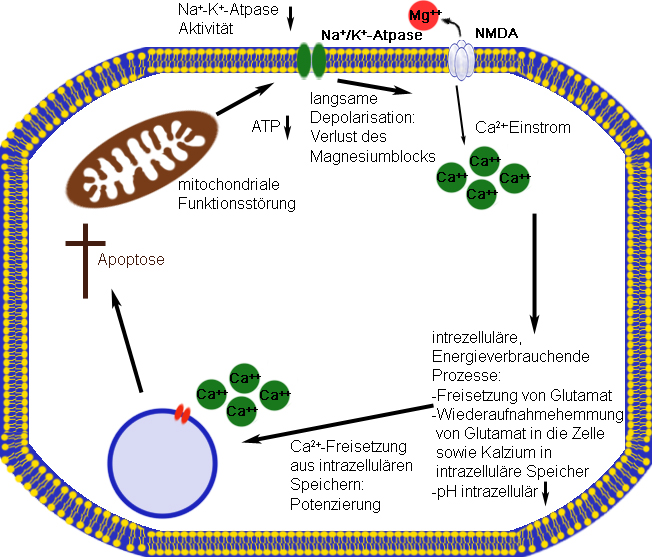- Neurotoxin
-
Ein Nervengift oder Neurotoxin ist ein Gift, das speziell auf Nervenzellen bzw. Nervengewebe einwirkt. Es stört vor allem Membranproteine und die Wechselwirkungen in Ionenkanälen. Nervengifte werden im Tierreich meistens als Verteidigungs- oder Beutegift gegen Wirbeltiere eingesetzt.
Neurotoxine sind meistens chemischen Ursprungs, jedoch können auch Strahlung und Ultraschall Störungen bei Nervenzellen hervorrufen.
Die meisten Neurotoxine sind exogene Toxine, sie stammen aus der Umwelt und werden vom Organismus aufgenommen. Darunter existieren auch einige Gase (z. B. Phosphin). Die häufigsten Nervengifte sind jedoch Feststoffe (Schwermetalle wie Cadmium, Blei, ...) und Flüssigkeiten (z. B. Ethanol).
Die Wirkung hängt stark von der Dosierung ab. Alkohol wirkt in geringen Mengen akut nicht toxisch, größere Mengen und längere Einnahme lähmen jedoch auch das Atmungssystem.
Excitotoxizität
Als Nervengifte wirken auch Substanzen, die im Körper produziert werden - endogene Neurotoxine. Eines dieser Gifte ist Glutamat, dessen Hauptbedeutung in seiner Rolle als Neurotransmitter liegt. Wird jedoch zu viel Glutamat frei gesetzt, reagieren die Zellen mit Apoptose und töten sich selbst ab. Dieser Prozess wird auch als Excitotoxizität bezeichnet.
Im Alltag verbreitete Nervengifte sind
- Alkohol
- Atropin bzw. Hyoscyamin
- Botulinumtoxin („Schönheitsmittel“ Botox)
- Nikotin
- Koffein bzw. Tein
Literatur
- Waltraud Stammel & Helmut Thomas (2007): Endogene Alkaloide in Säugetieren. Ein Beitrag zur Pharmakologie von körpereigenen Neurotoxinen. In: Naturwissenschaftliche Rundschau. 60(3), S. 117-124. ISSN 0028-1050
Siehe auch
Wikimedia Foundation.

